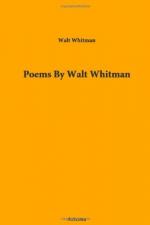|
This section contains 8,155 words (approx. 28 pages at 300 words per page) |

|
SOURCE: "Reconsidering Whitman's Intention," in Minor Prophecy: Walt Whitman's New American Religion, Indiana University Press, 1989, pp. 1-11.
In the following essay, Kuebrich contends that Whitman intended his poetry to be, in a sense, a "new religion," in that he hoped to encourage the spiritual growth of his readers and offer a vision which would fuse religious experience with contemporary views on science, technology, and the emerging American republic.
"A little group are to signalize here on the prairies by the Wabash, the day that gave us the most divine of men."1 This statement would not be noteworthy as a Christian's declaration of his plans to commemorate the birth of Christ. It is remarkable, however, because its author was not a Christian but a Whitmanite, the day referred to is not December 25 but May 31, and the "most divine of men" is not Christ but Walt Whitman.
Harvard professor Bliss...
|
This section contains 8,155 words (approx. 28 pages at 300 words per page) |

|


